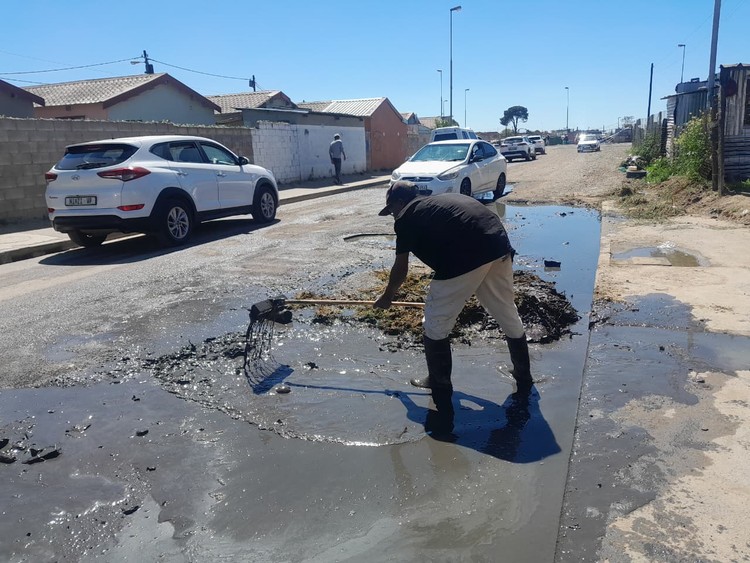
30 September 2025
A Bloekombos resident sweeps sewage from the street as Henk Boshoff, Commissioner at the SA Human Rights Commission, walks through the community on Monday. Photos: Vincent Lali
The smell of raw sewage filled the air as Henk Boshoff, Commissioner at the SA Human Rights Commission, walked through the streets of Bloekombos in Cape Town on Monday.
His visit, accompanied by City of Cape Town officials and community leaders, followed complaints by residents about recurring sewage blockages and poor waste management.
According to a statement by the municipality in August, the Water and Sanitation sewer maintenance team attended to 1,270 sewer blockages in Wallacedene and 546 in Bloekombos. The majority of the blockages were caused by nappies, solid waste and other objects like tyres in the sewer system.
Community leader Uviwe Ndikolo explained that residents put tyres over open manholes to prevent motorists from getting stuck. “Cars with small tyres fall into the sewage drains when they have no lids or don’t close properly,” he said. “When big cars drive over the tyres, they sink inside so residents place another tyre.”
Another community leader Linda Phito said, “If the City handed out rubbish bags to families, they would not dump rubbish.”
Pointing out the streams of sewage, Phito asked the City officials present to ensure that the roads are kept clean. “Residents sell food next to the roads. The City must maintain the sewage pipes and the roads,” he said.
A tyre is placed on a broken manhole in Bloekombos to warn motorists. The City of Cape Town says the tyres fall in and block the sewers, causing overflows.
During the walk through the community, Boshoff stopped on Maroela Road near Bloekombos High School which was full of potholes and smelly sewage overflowing from broken manholes.
Sigqibo Nogeya, the City’s head of waste and water conveyance, said municipal teams often aren’t able to unblock pipes because shacks have been built on top of them. He said the City has set aside a budget to upgrade the sewage pipes in July next year. This will be part of a R355-million city-wide plan to upgrade ageing infrastructure and reduce overflows.
In Bhabhalaza Street, Boshoff pointed out that the “rubbish looks like it has not been attended to for a long time” and noted that “the stench is terrible. There are vendors who sell food to people and just next to them is a blocked sewer. We need to find a solution”.
He promised to return to the community with officials from the national Department of Human Settlements and of Water and Sanitation. It’s important that decision makers be here, especially when it requires very difficult decision-making to deal with these issues,” said Boshoff.